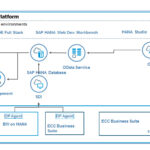Cloud computing has revolutionized the way businesses operate in today’s digital era. As more organizations embrace remote work, cloud-based solutions have become essential for facilitating collaboration, ensuring data security, and optimizing resources. Cloud computing enables companies to store, manage, and process data on remote servers instead of relying on local hardware or software. This shift has not only streamlined business operations but also fostered greater flexibility, scalability, and cost efficiency.
With the increasing prominence of remote work, the importance of cloud computing for distributed teams cannot be overstated. Using the cloud, remote teams can collaborate on projects from anywhere, anytime, and on any device. This level of flexibility and accessibility has made it possible for organizations to adapt to the changing work environment while maintaining high levels of productivity and efficiency.
This post will explore ten key advantages of cloud computing for remote teams, from cost savings and data security to environmental sustainability and competitive advantage. By understanding these benefits, you can harness the full potential of cloud-based solutions and propel your remote team’s success in an increasingly connected world.
1. Data Security
Data security is a crucial concern for any organization, and cloud computing offers several robust solutions to protect sensitive information. Cloud service providers typically employ advanced security measures, including data encryption, intrusion detection systems, and multi-factor authentication, to safeguard your data from unauthorized access.
Moreover, some cloud providers offer additional layers of security, such as a VPS with WireGuard, which further enhances data protection through an advanced VPN protocol. This service allows users to create a secure network for their applications, websites, or remote teams, ensuring enhanced privacy and security. You can keep your remote team’s information safe by entrusting your data to a reputable provider that continuously updates its security infrastructure to stay ahead of emerging threats.
2. Cost Savings
One of the most compelling benefits of cloud computing is the significant cost savings it offers. By leveraging cloud services, remote teams can reduce their IT infrastructure expenses, eliminating the need for purchasing and maintaining costly hardware. With no upfront investments in equipment, companies can allocate their resources more efficiently.
Additionally, the pay-as-you-go pricing model of many cloud service providers allows businesses to pay only for the resources they actually use. This flexible approach not only helps control costs but also ensures that remote teams have access to the required resources whenever needed.
3. Scalability and Flexibility
Cloud computing provides unparalleled scalability and flexibility to remote teams. Whether a business is rapidly growing or facing seasonal fluctuations in workload, cloud services can be easily scaled up or down according to their requirements. This adaptability ensures that remote teams can always meet their performance goals without overspending on resources.
Furthermore, cloud computing grants access to advanced technologies that might otherwise be unattainable for smaller organizations. Remote teams can harness the power of cutting-edge tools and applications, enabling them to stay competitive and agile in an ever-evolving digital landscape.
4. Accessibility and Collaboration
Cloud computing allows remote team members to access essential files and applications from any location, as long as they have an internet connection. This global accessibility fosters a more inclusive work environment where employees can contribute to projects regardless of their geographical location.
In addition, cloud-based collaboration tools enable real-time teamwork and seamless communication among team members. With features like document sharing, version control, and video conferencing, remote teams can work together more effectively, ensuring that projects are completed efficiently and deadlines are met.
5. Disaster Recovery and Backup
Cloud computing plays a crucial role in disaster recovery and data backup for remote teams. Most cloud service providers offer automated backup solutions, ensuring your data is regularly saved and stored in multiple locations. This redundancy reduces the risk of data loss and helps maintain business continuity in case of unexpected disasters.
Moreover, cloud-based disaster recovery solutions typically offer faster recovery times compared to traditional methods. By leveraging the cloud’s distributed infrastructure, remote teams can quickly restore their operations, minimizing downtime and potential revenue loss.
6. Environmental Sustainability
Embracing cloud computing contributes to environmental sustainability. Organizations can significantly decrease their energy consumption and carbon footprint by reducing the need for on-premises IT infrastructure. Cloud service providers optimize resource usage through virtualization and efficient data center designs, ensuring the environmental impact is minimal.
By choosing cloud-based solutions, remote teams not only enjoy the benefits of enhanced performance and accessibility but also contribute to a greener economy, fostering a more sustainable future for all.
7. Automatic Software Updates
Another key advantage of cloud computing is the automatic software updates. Remote teams no longer need to worry about manually updating their applications or dealing with compatibility issues. Cloud service providers take care of the updates, ensuring that the latest features and tools are readily available to users.
This automated process reduces downtime and eliminates the burden on IT staff, allowing them to focus on more strategic tasks. Remote teams can benefit from up-to-date software without dedicating additional resources to maintenance.
8. Better Resource Management
Cloud computing helps remote teams optimize their resource management. By offloading IT infrastructure maintenance to cloud service providers, in-house IT staff can concentrate on strategic projects and initiatives that add value to the organization.
Cloud-based solutions also streamline various processes, making it easier for remote teams to manage their workloads efficiently. This optimization of resources leads to increased productivity and effectiveness, ultimately contributing to the organization’s success.
9. Competitive Advantage
Adopting cloud computing gives remote teams a competitive edge in the market. With the faster deployment of new solutions, improved agility, and access to innovative technologies, organizations can respond more quickly to changing market conditions and customer needs.
By leveraging the power of cloud computing, remote teams can stay ahead of their competitors, ensuring that their products and services remain relevant and appealing to their target audience.
10. Compliance and Governance
Cloud computing simplifies regulatory compliance and governance for remote teams. Many cloud service providers offer built-in compliance tools and frameworks, enabling organizations to meet industry-specific regulations with ease. Centralized data management in the cloud also helps maintain better control over data access and usage.
Improved audit capabilities, including real-time monitoring and detailed reporting, allow remote teams to demonstrate their compliance with regulatory requirements and reduce the risk of penalties or fines.
Conclusion
Cloud computing offers a myriad of advantages that make it an invaluable asset for remote teams. From cost savings and scalability to data security and environmental sustainability, cloud-based solutions empower organizations to enhance their productivity, efficiency, and competitiveness in an increasingly digital world. By embracing the power of cloud computing, remote teams can unlock their full potential and drive their organization’s success.








